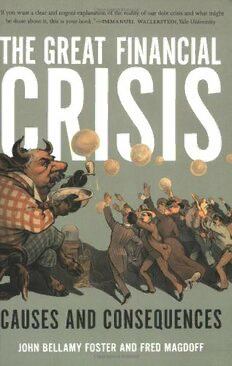
The Great Financial Crisis: Causes and Consequences PDF
164 Pages·2009·9.157 MB·English
Most books are stored in the elastic cloud where traffic is expensive. For this reason, we have a limit on daily download.
Preview The Great Financial Crisis: Causes and Consequences
Description:
In the fall of 2008, the United States was plunged into a financial crisis more severe than any since the Great Depression. As banks collapsed and the state scrambled to organize one of the largest transfers of wealth in history, many—including economists and financial experts—were shocked by the speed at which events unfolded.In this new book, John Bellamy Foster and Fred Magdoff offer a bold analysis of the financial meltdown, how it developed, and the implications for the future. They examine the specifics of the housing bubble and the credit crunch as well as situate current events within a broader crisis of monopoly-finance capitalism—one that has been gestating for several decades. It is the "real" productive economy's tendency toward stagnation, they argue, that creates a need for capital to find ways to profitably invest its surplus. But rather than invest in socially useful projects that would benefit the vast majority, capital has constructed a financialized "casino" economy that neglects social needs and, as has become increasingly clear, is fatally unstable. Written over a two-year period immediately prior to the onset of the crisis, this timely and illuminating book is necessary reading for all those who wish to understand the current situation, how we got here, and where we are heading.
See more
The list of books you might like
Most books are stored in the elastic cloud where traffic is expensive. For this reason, we have a limit on daily download.
